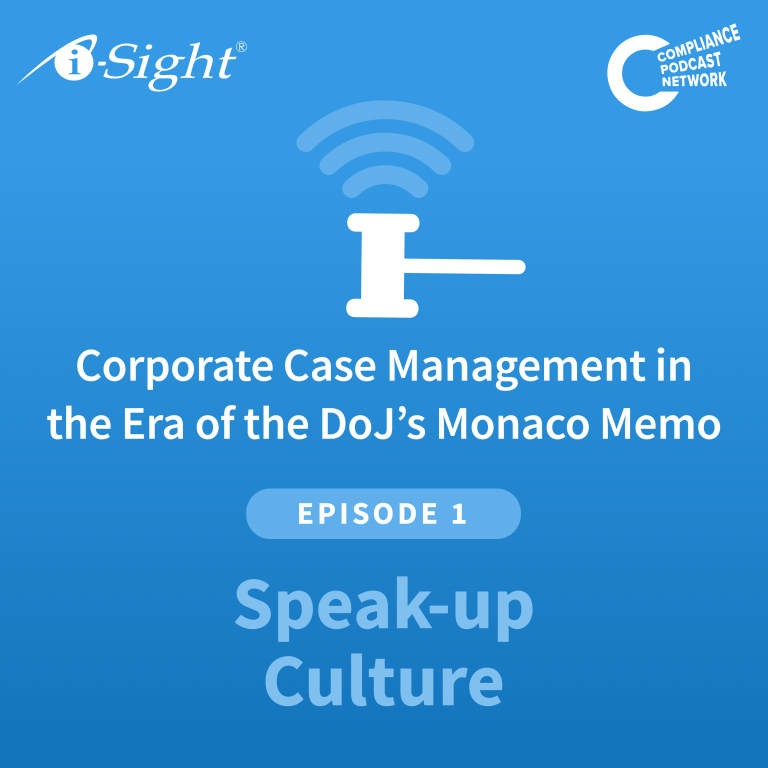Welcome to a special five-part blog series, entitled Corporate Case Management in the Era of the DoJ’s Monaco Memo, sponsored by i-Sight Software Solutions (i-Sight). Over this series, Jakub Ficner, Director of Partnership Development, and I consider how the Monaco Doctrine and Monaco Memo have impacted compliance in several key areas. We not only detail the changes wrought by the Monaco Memo but how compliance professionals can respond to these new challenges. In Part 1, we look at the role of a speak up culture in responding to the Department of Justice (DOJ) changes set out in the Monaco Memo.
There have been some significant announcements from the DOJ over the past year, which have really re-emphasized what I think many thought were the nuts and bolts of compliance. It started a year ago when Deputy Attorney General Lisa Monaco gave a speech where, for the first time, the DOJ talked about corporate culture as a key indicia that the Department would evaluate if a company was under investigation, leading to corporate culture being evaluated in enforcement actions over the past 12 months.
That led to the now formalized Monaco Doctrine, as memorialized in the Monaco Memo. Corporate culture is now a key assessment the DOJ will make in Foreign Corrupt Practices Act (FCPA) investigations or enforcement actions. How does an organization create and maintain an ethical culture? Key questions include how do you produce a culture? How do you assess that culture? How do you monitor that culture? How do you continuously improve your culture? How is a speak up culture so critical to a good corporate culture? How should a company think through responding to these new developments?
Ficner said the first step for any organization should be “how do we encourage and foster a speak up culture?” He said you should begin with differentiating between a whistleblower hotline and whistleblower program versus a speak up culture. “By focusing on a speak up culture, a company is moving away from potentially the negative connotation associated to the word whistleblower, to one of really fostering and encouraging your employees to speak up and voice any concerns if they encounter them. There is a difference because a speak up culture can help to foster a community.” There can be multiple different channels where an employee can voice their concerns and they will be heard by the organization. Ficner believes it is a “two-step process of building a multi-channel approach to voice concerns and then having a process in place to have a consistent approach to dealing with a concern once it has been voiced.”
There are additional steps beyond simply providing the mechanism to allow employees to speak up. Ficner said, “setting expectations is another key. An organization should desire to set expectations for the employees that have come forward in terms of next steps and roughly the process that we’ll follow from there. Once the employees have taken the active step of coming forward with a concern, they need to know that their voice has been heard, and that there will be a process followed. They should be given a rough expectation of what that process will be going forward.”
The ability to actively keep a reporter who has submitted a complaint or concern up to date as the process moves forward and then having rules in place to keep that process moving forward is also critical. After an organization receives the information, it should keep the person up to date and informed on the various steps or milestones as it transitions through the process. One great example is it starts with a two-way portal. The ability for an initiator to submit their concern, actively be able to look up the status of their concern and potentially add additional information to their concern, enabling them to either remain anonymous or choose to be named and associated to that concern or allegation should be maintained throughout the process. Unfortunately, many organizations fall down on these steps. This failure can have a very negative impact on a speak up ethos and an overall culture of ethics and compliance in an organization.
Ficner concluded by noting, once an organization has such information, it can then start to use it to improve any compliance program deficiencies. It can be shared with various stakeholders, from executive leadership to the Board of Directors, on the effects of a good compliance program and the effects of a bad compliance program. He noted, “that is where the investment starts to come in as organizations see that having a strong ethical program in place that encourages first culture speak up and then a structured process that gives us the data that we need to reinforce it is a benefit to the organization.”
Join us for Part 2, where we consider the importance of strategic triage.






